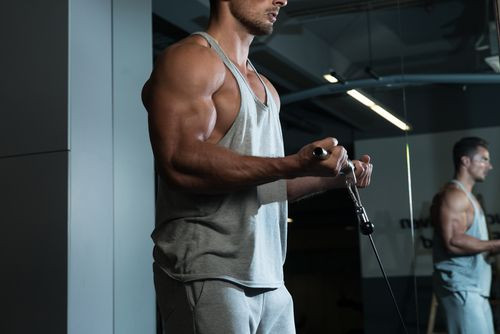Those Post-Workout Cocktails May Be Doing A Number On Your Muscles: How Binge Drinking May 'Impair Recovery And Adaptation To Training'

Happy hour after a strenuous workout may not be such a good idea. Contrary to other insufficiently researched workout theories — such as the ineffectiveness of exercise before bed or that sex before a workout negatively affects muscle building — a new study proves post-workout binge drinking does indeed affect muscle recovery. More specifically, the PLoS ONE study finds, excessive alcohol consumption after exercise impairs rates of protein synthesis in muscle repair and rebuilding.
The study authors explain, "Alcohol ingestion suppresses the anabolic response in skeletal muscle and may therefore impair recovery and adaptation to training and/or subsequent performance." To find these results, the Australian researchers conducted a study that examined post-exercise protein synthesis with vodka. They had eight physically active adult males participate in three rigorous exercise sessions involving resistance and high-intensity intervals, which included cycling and weightlifting. After the first trial, participants took two servings of 25 grams of protein, one before exercise and another four hours after recovery. For the second trial, participants took the same amount of protein but with alcohol. For the third, they had carbohydrates with alcohol. They rested in between each of the three trials for two weeks, maintaining their normal workout routine.
The vodka dose, by the way, which was accompanied with either protein or carbs, was chosen by the reported amount that athletes binge drink: 12 beverages, on average. For the study, participants started drinking screwdrivers (vodka and OJ) every 30 minutes, one hour after their workouts, for three hours. The cocktails contained two shots mixed with OJ (six equal volumes of one part vodka to four parts orange juice for the entire study). The protein-only trial required drinking solely OJ. The results? Well, alcohol reduced protein synthesis in the alcohol-protein trial by 24 percent and by 37 percent in the alcohol-carb trial.
Clearly, where protein was absent, muscle protein synthesis was most impaired. The researchers also noted, however, that the results show, “Alcohol consumption generates oxidative stress and inflammation and the potential to disrupt endoplasmic reticulum homeostasis.” In other words, the endoplasmic reticulum — an organelle responsible for folding proteins so they may carry out their function in cells — cannot do its job effectively because of the stress caused by alcohol.
So, next time you decide to grab a drink with friends after a strenuous workout, and you know you may become inebriated, keep in mind it may take longer for you to move up to 80 lbs. on the leg lift machine.
Source: Parr, EB, Camera DM, Areta JL, et al. Alcohol Ingestion Impairs Maximal Post-Exercise Rates of Myofibrillar Protein Synthesis following a Single Bout of Concurrent Training. PLoS ONE. 2014.
Published by Medicaldaily.com



























